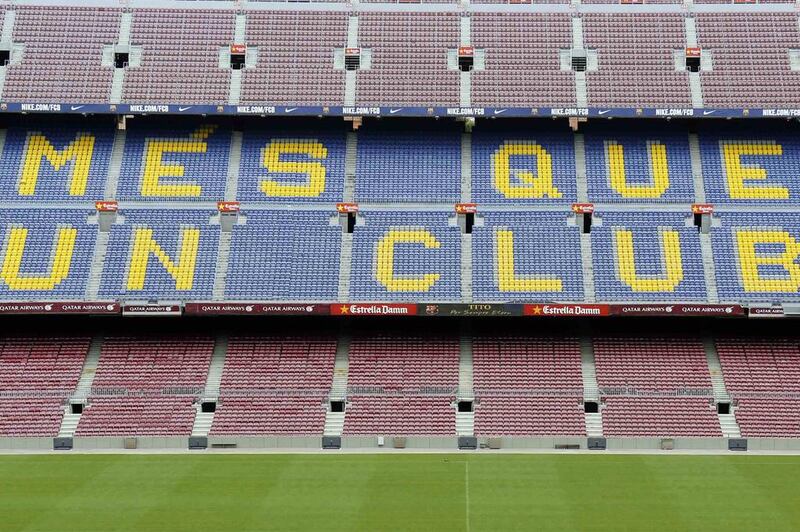The phone calls, emails and texts begin four or five months before each clasico at Camp Nou, usually from acquaintances or even strangers.
After initial pleasantries, they get to the point: "We're thinking of coming to Barcelona to see Barcelona against Real Madrid. What chance of tickets?"
For 15 years, this writer saw it as a challenge to help. I have been covering clasico games in person since 2000, arriving early at Camp Nou to prepare to write about the game. When close friends started asking to see if I could help get tickets, I did just that.
Given the scarcity of tickets for the most glamorous game in world football, help usually meant negotiating on the street two or three hours before kick-off. It worked.
The source of the tickets would usually be elderly Catalan socios with a spare season ticket card or two, often ones that had been in their family for generations.
If those tickets worked out at £15 (Dh78) per game and they could sell a clasico one for £50, they were usually happy.
It was unsophisticated, supply meeting demand in the days before tickets were sold on line, printed at home or downloaded onto smartphones.
The person buying the ticket often had to accompany the one selling it, which led to some interested cross cultural conversations where neither spoke the language of the other.
One friend said his conversation amounted (in English) to: “Barcelona, very good.”
Read more: Diego Forlan – Javier Mascherano's influence in midfield spurs Barcelona's attack-minded defence
Also see: Barcelona's Lionel Messi lights up Argentina in World Cup qualifying – in pictures
And watch: Barcelona and Real Madrid contest el clasico for kids, and impress – video
“Manchester United, very good,” reciprocated the elderly Catalan. And that was that, back in the days when Manchester United merited that description.
All I could offer was being able to speak Spanish and a knowledge where the old men operated near the stadium.
Also, I knew the layout of the Camp Nou, the difference between a nosebleed seat in the sky and one in the main stand. And I knew a bully or snake oil salesman from someone who genuinely had tickets.
The word spread. In 2003, I got 26 people into a clasico, all British, from a variety of backgrounds. There was the company director who was happy to pay €120 (Dh500) per ticket to impress his new girlfriend. They were fixed up first.
Three young men from Manchester were harder to please. I managed to get them tickets for €50 each. They wanted three for €50. Ideally, they did not want to pay anything at all.
They probably wanted to play in the game, too.
I never took a penny, only satisfaction from people who greatly appreciated getting into the clasico. It would take an hour of my time once a year.
The prices gradually crept up, but they were still reasonable given the status of the game. Barcelona had not fully worked out how to tap into the demand and their own website did not start selling tickets until 2008, the year Pep Guardiola took charge.
That was also the year that ticket prices start to shoot up and the clasico became an even bigger football tourist magnate for those around the world who wanted to see this brilliant Barca.
There was a surge in demand from wealthy Scandinavians when Zlatan Ibrahimovic joined Barca.
Sensing demand, the Catalan club pushed the average face value price of tickets to non season ticket holders towards €100 and there was still no shortage of takers.
Barca also dealt with ticket agencies who would buy tickets from the club for every game each season, with the money paid up front at the start of the season.
As Camp Nou does not sell out (average crowds are 76,000), the agencies take a hit on tickets for most games but profit heavily from the clasico.
Prices outside the ground spiralled to €300, with fans paying €500 if they wanted a good ticket guaranteed in the weeks before the game. Peace of mind came at a price.
Prices, both official and unofficial, have continued to rise every year for the only game which sells out Camp Nou’s 98,600 capacity each season.
The market has changed too. Where elderly Catalan men once sold extra season ticket cards, younger, wilier touts, many of them from a Moroccan background, work the streets.
Some of the tickets are of the print at home variety, easily copied and there are more forged tickets around. You see people in tears who have paid hundreds of Euros for a useless piece of paper.
Even with tickets going for €400 outside the ground, tickets were in short supply and an estimated 2,000 people did not get into the game. The odd one got lucky.
That’s when I gave up trying to help after only getting in half the 18 people I’d tried to sort out.
The big business continues, at the ground and online. In the Barca games leading up to the claisco, cards were handed out around Camp Nou with messages such as, "Big companies want tickets for the clasico. Call XX for the best €€€."
Several factors can affect the ticket price. A weekend league game will be more attractive to people than midweek in winter and some clasicos are bigger than others.
Barca and Madrid going for the title is a bigger game than Barca being 10 points ahead with eight games to play, as now.
Another factor can put a dampener on prices.
It was raining heavily in Barcelona on Friday, just as it was when Barcelona met Arsenal two weeks ago. Until it is renovated and covered by 2020, 60,000 of Camp Nou’s seats remain uncovered.
The Catalans maybe watching the best team in the world, but many do not like to get wet in the process.
sports@thenational.ae
Follow us on Twitter @NatSportUAE
Like us on Facebook at facebook.com/TheNationalSport






